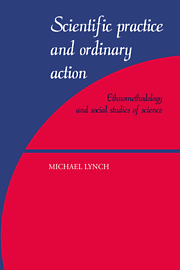Book contents
- Frontmatter
- Contents
- Acknowledgments
- Introduction
- 1 Ethnomethodology
- 2 The demise of the “old” sociology of science
- 3 The rise of the new sociology of scientific knowledge
- 4 Phenomenology and protoethnomethodology
- 5 Wittgenstein, rules, and epistemology's topics
- 6 Molecular sociology
- 7 From quiddity to haecceity: ethnomethodological studies of work
- Conclusion
- Name index
- Subject index
3 - The rise of the new sociology of scientific knowledge
Published online by Cambridge University Press: 03 December 2009
- Frontmatter
- Contents
- Acknowledgments
- Introduction
- 1 Ethnomethodology
- 2 The demise of the “old” sociology of science
- 3 The rise of the new sociology of scientific knowledge
- 4 Phenomenology and protoethnomethodology
- 5 Wittgenstein, rules, and epistemology's topics
- 6 Molecular sociology
- 7 From quiddity to haecceity: ethnomethodological studies of work
- Conclusion
- Name index
- Subject index
Summary
If anything holds together the various programs in the “new” sociology of scientific knowledge that have emerged since the early 1970s, it is their commitment to a “radical” view of scientific knowledge. As the many current debates in the field indicate, however, there is little agreement about what this means: Is the radicalism primarily epistemological in scope, or should it also be overtly political and aligned with older traditions of ideology critique? Does the target of radical critique include conventional theories and methods in the social sciences as well as the natural sciences? It is also not at all clear, despite its avowed radicalism, that the strong program articulates a decisive break with prior traditions in the sociology of knowledge. In this chapter, I argue that despite their supposedly radical commitments, the new sociologies of science use some familiar social science idioms and explanatory strategies, and they run into some familiar pitfalls associated with the role of ordinary language in philosophical and sociological investigations. In subsequent chapters I invoke Wittgenstein's later philosophy of language and Garfinkel's ethnomethodology to advocate a more complete break with the conventional views of language and social scientific practice that continue to be advanced in the sociology of knowledge.
As R. J. Anderson, J. A. Hughes, and W. W. Sharrock argue in an ethnomethodological critique of the strong program, some of the familiar puzzles and complaints about the older sociology of knowledge apply no less forcefully to the “new” programs.
- Type
- Chapter
- Information
- Scientific Practice and Ordinary ActionEthnomethodology and Social Studies of Science, pp. 71 - 116Publisher: Cambridge University PressPrint publication year: 1994

